One reason why I don’t shop at Supermarkets
I no longer do a weekly shop at the supermarket. I haven’t taken part in this ritual since July 2012, when I signed up to Plastic Free July and pledged to stop buying disposable plastic forever. It wasn’t my plan to stop shopping in the supermarkets, but once I limited myself to items not packaged in plastic, it didn’t leave much left to buy. The odd jar, a bag of flour, that was about it. Once I’d traipsed up and down every aisle and only filled my basket with a handful of items, the novelty wore thin. We started shopping elsewhere, namely the markets and the bulk food stores.
I’d never liked giving my money to the supermarkets, but their convenience lured me in. I wanted to support local businesses, local producers and sustainable practices like organic farming, but it was a big change to undertake. Once the supermarkets stopped being convenient and I had a reason (along with the drive and motivation) to go elsewhere, I did, and I haven’t looked back.
It was only once I’d stopped going to the supermarkets that I realised that most of the food I was buying from there wasn’t food at all, but a mix of additives, preservatives and flavours that looked like food. The promotions would lure me in, even though it was the same things on offer, week in, week out. Things I didn’t need and didn’t want…but the bargain factor meant they often ended up in the trolley. Not such a bargain, buying things that I didn’t intend to buy, is it?! It was a habit, one that I didn’t know I had until I broke it.
If you happened to go into my local supermarket this week, this is what you’d be seeing in pride of place at the ends of the aisles on “special”. See if you can spot any real food amongst it all.
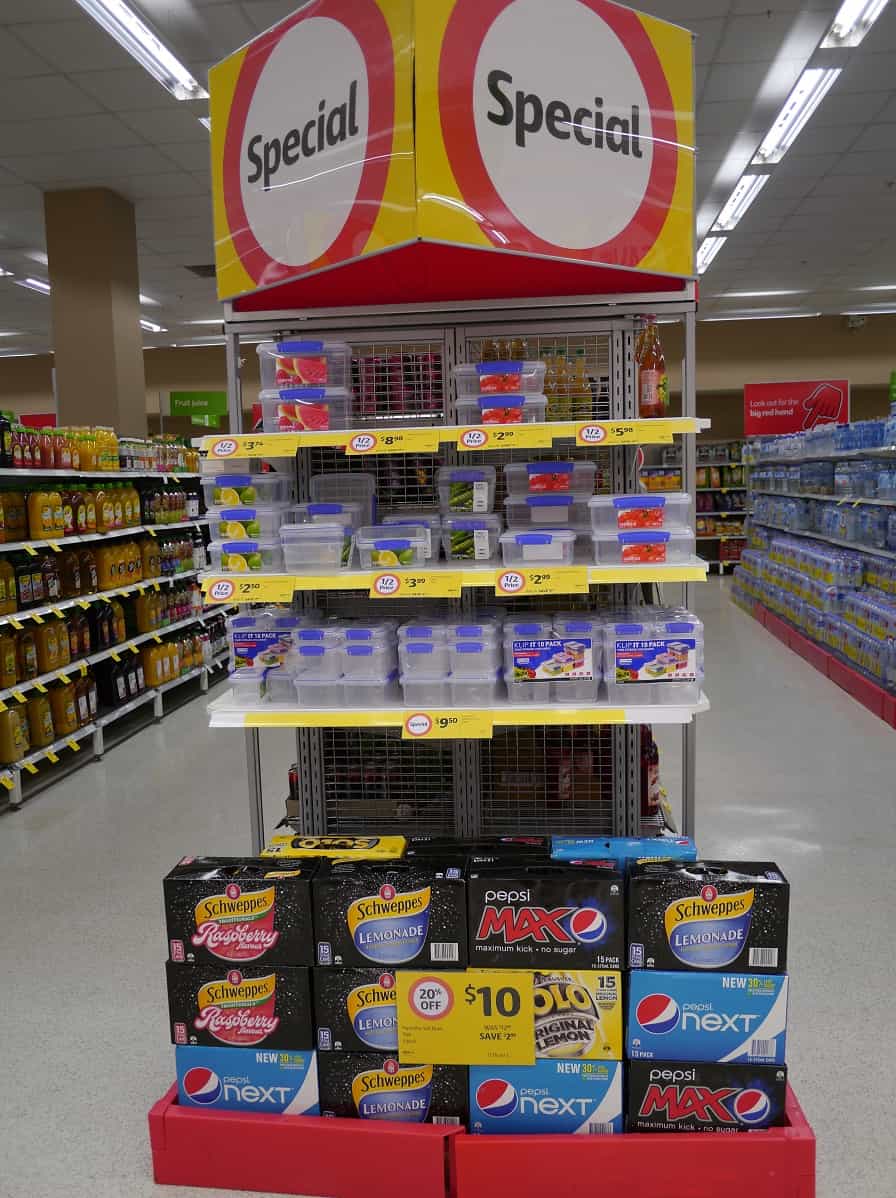
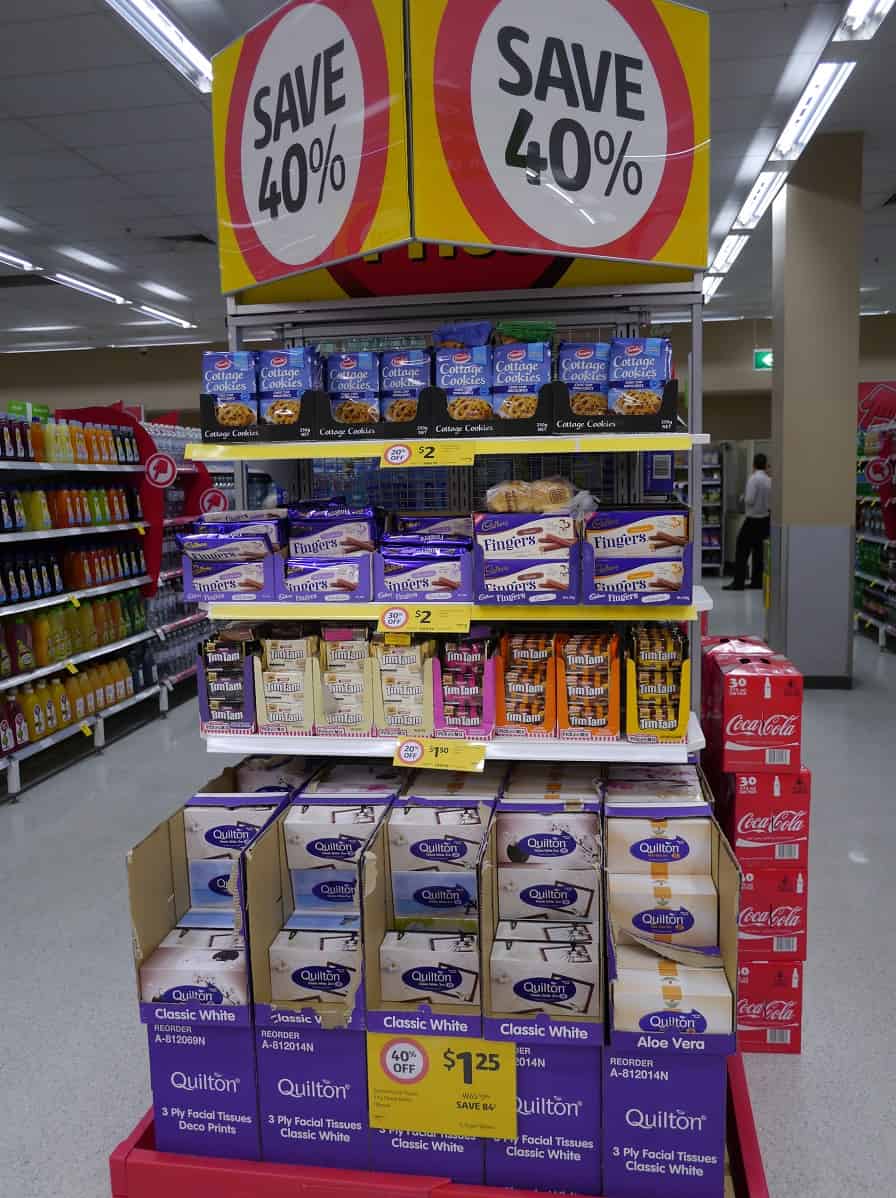
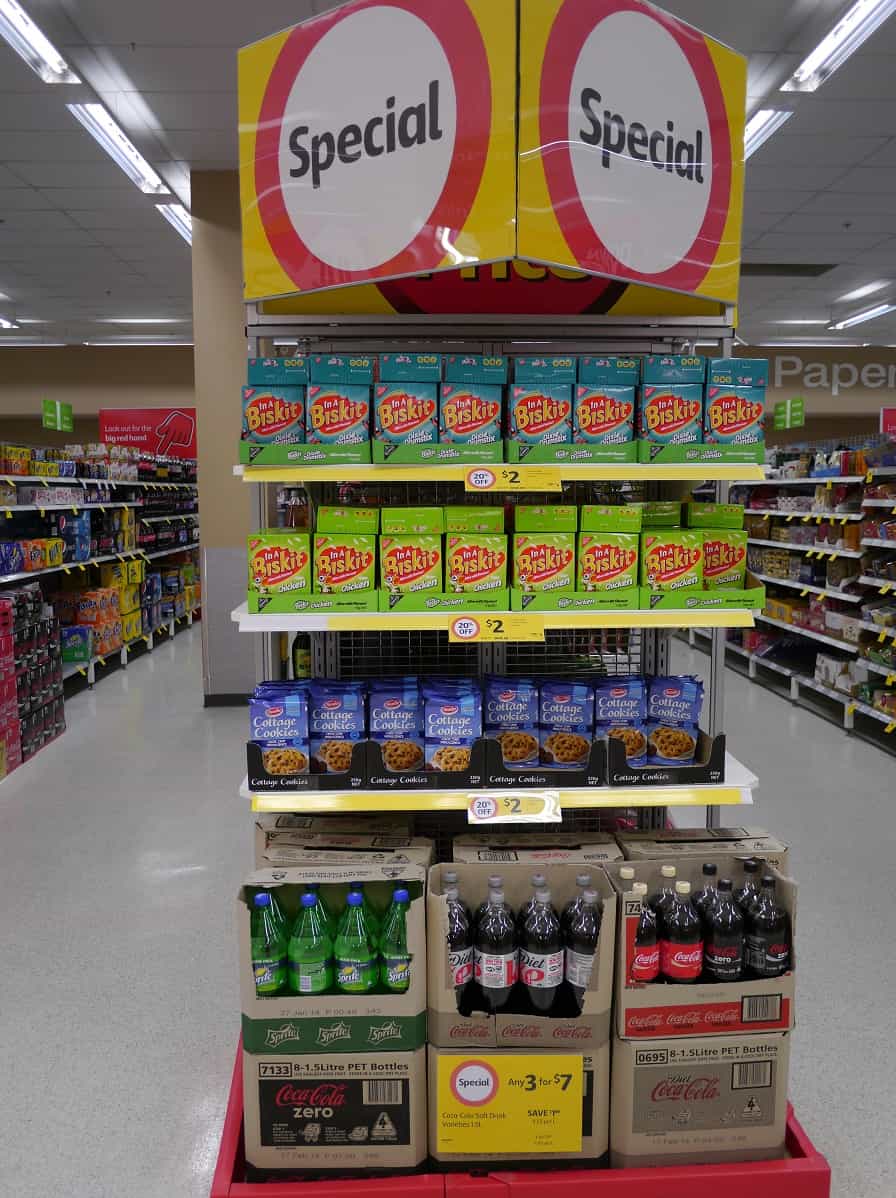
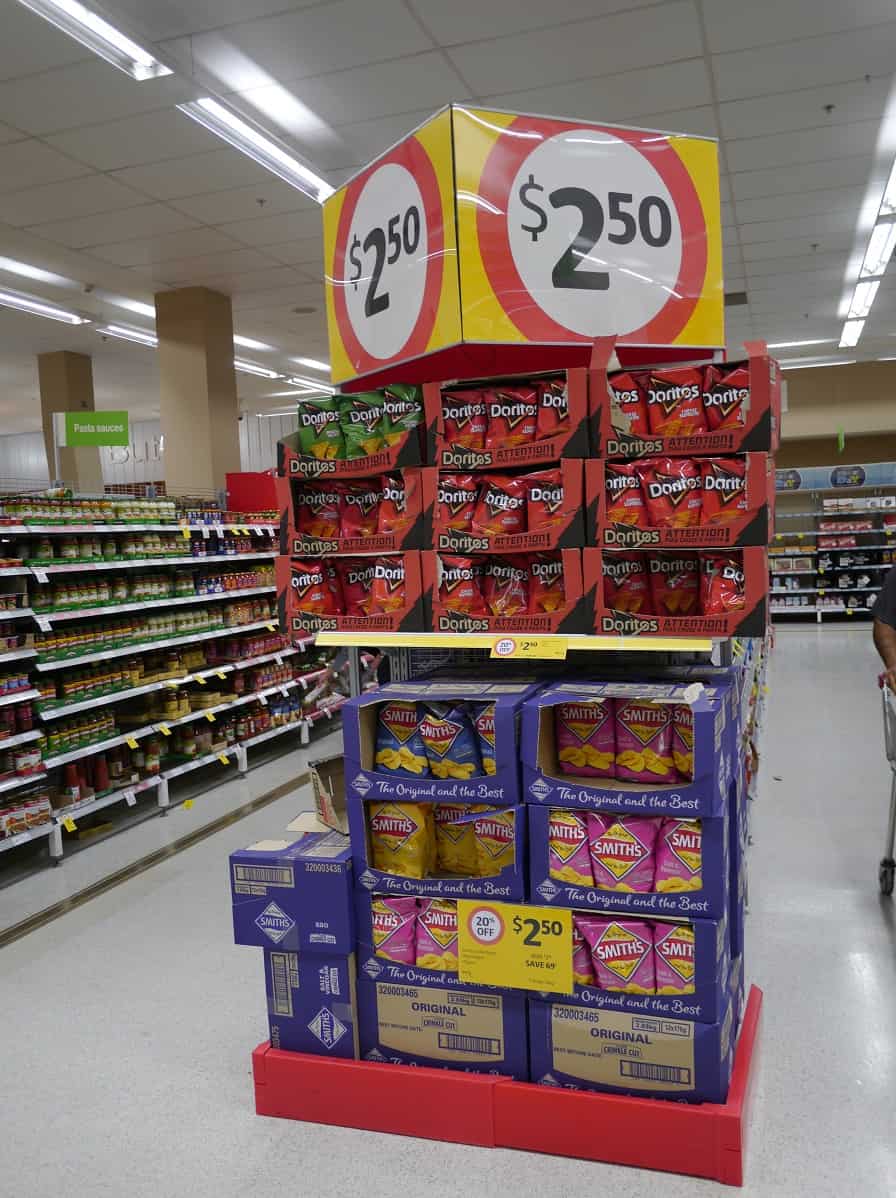
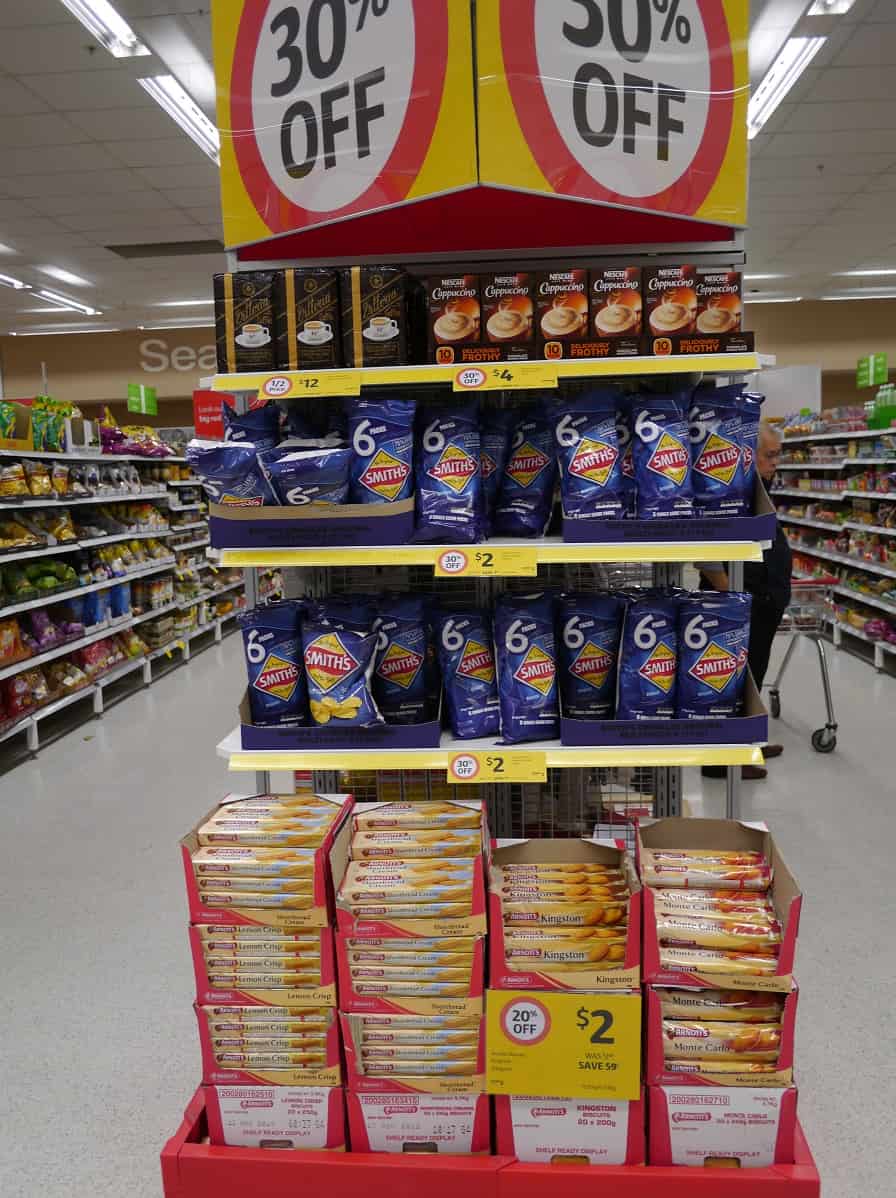
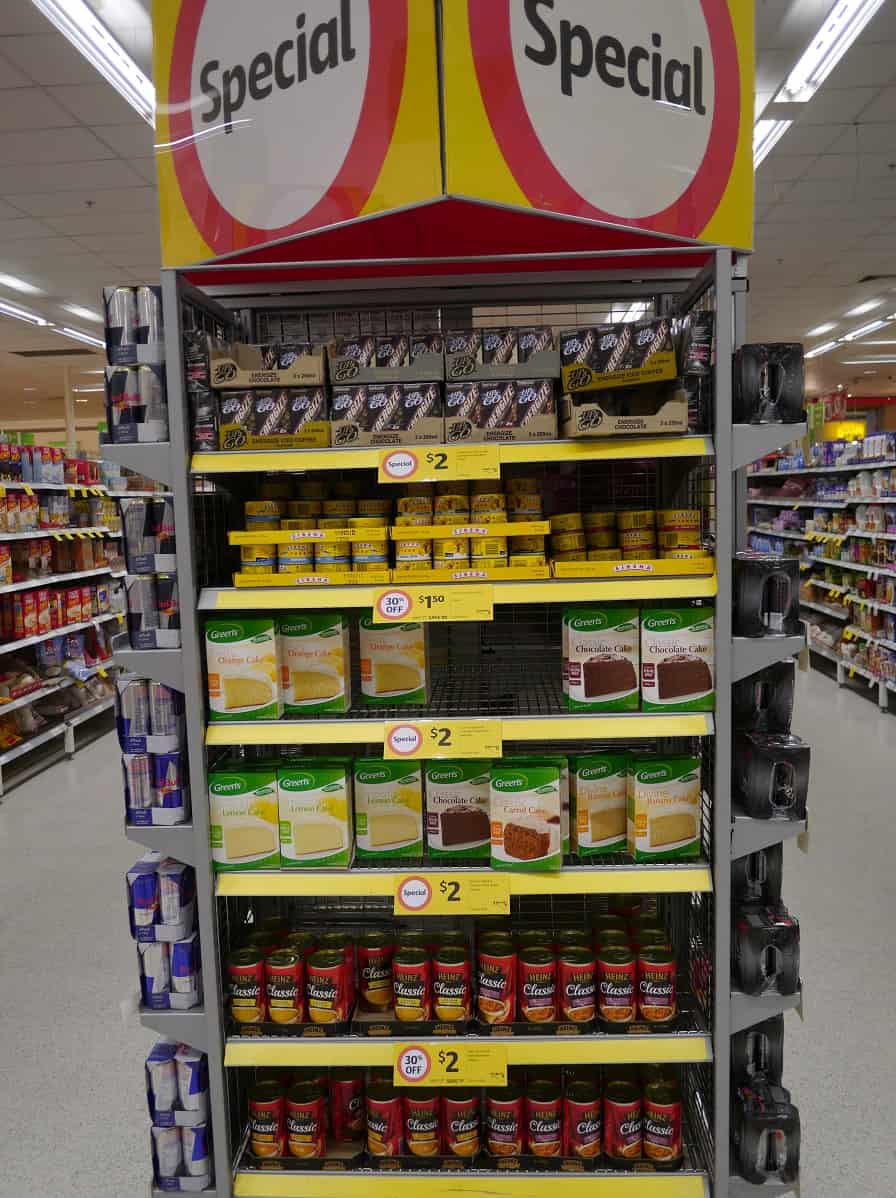
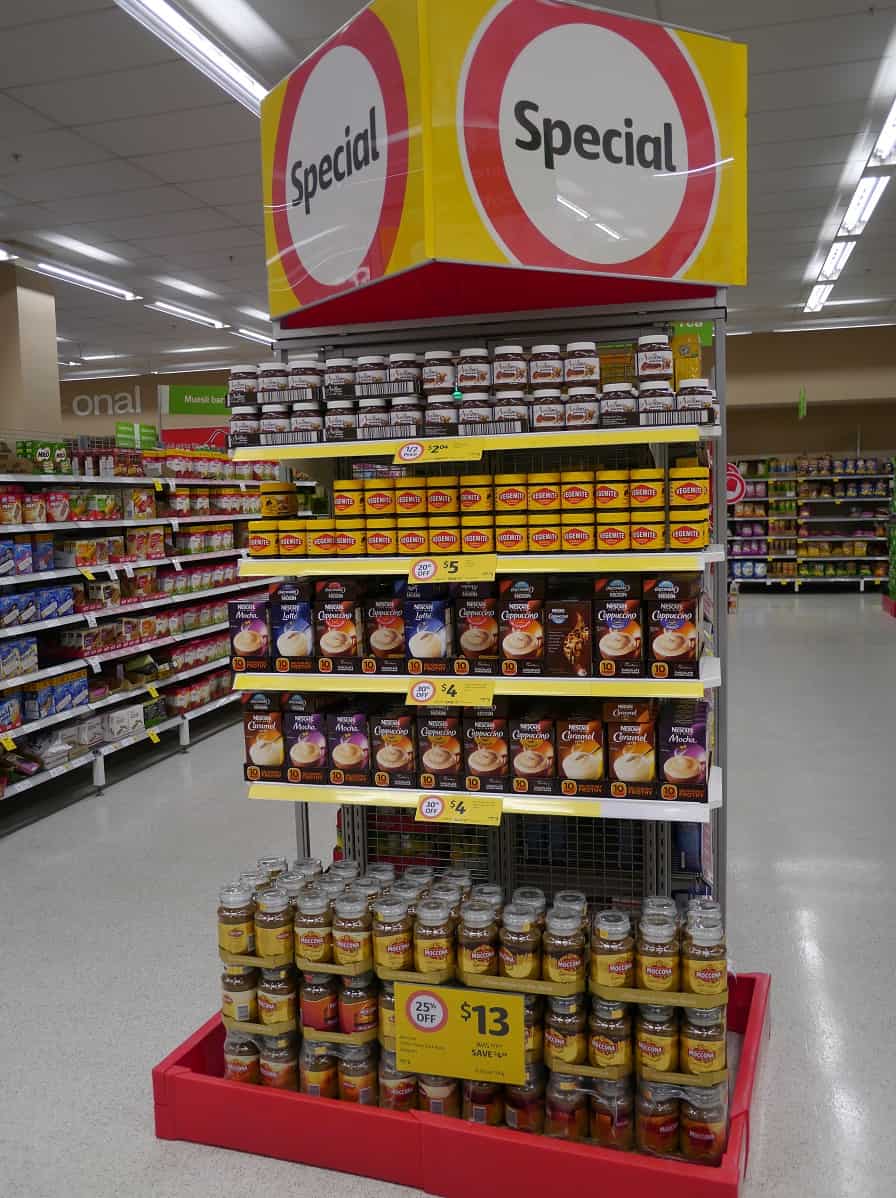
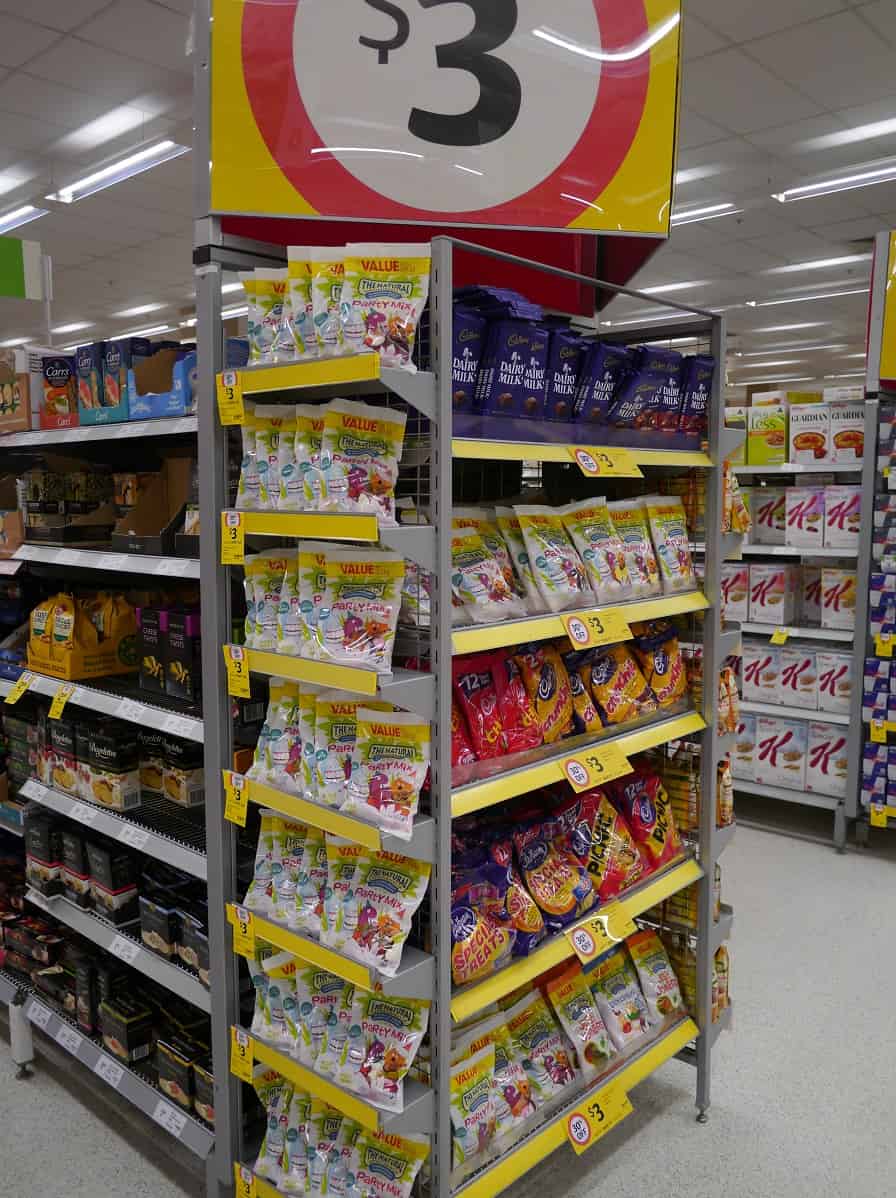
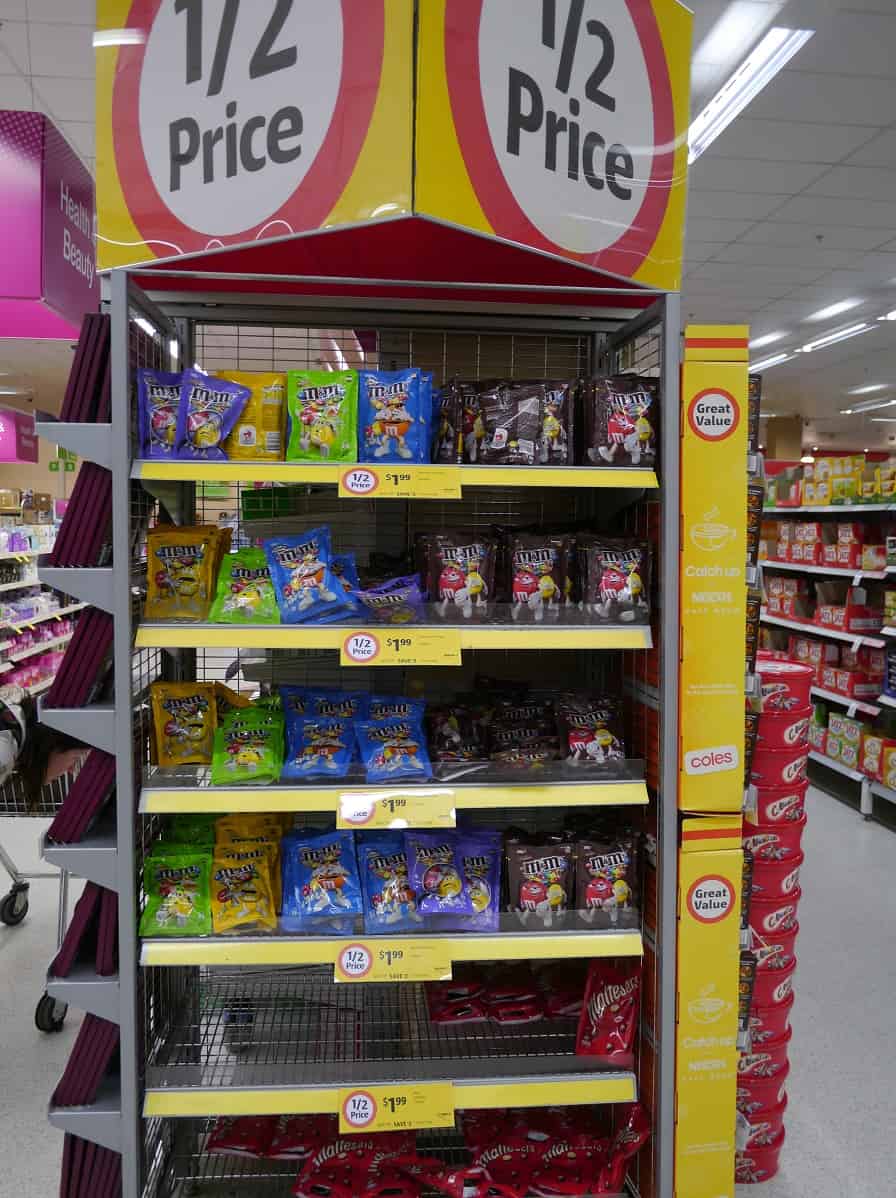 Once you’ve looked past the junk, preservatives, additives and over-packaged “food” you’ll find there’s not much left. Plus, you notice how all of that stuff is branded? That’s because companies pay the stores to put their products on display there. It’s why you rarely see non-branded goods in these premium spots.
Once you’ve looked past the junk, preservatives, additives and over-packaged “food” you’ll find there’s not much left. Plus, you notice how all of that stuff is branded? That’s because companies pay the stores to put their products on display there. It’s why you rarely see non-branded goods in these premium spots.
Buying this stuff isn’t a bargain. It’s not real food. It’s bad for our health, it’s polluting the environment (did you see how much plastic there was?!) and it’s lining the coffers of the big multinational companies and the supermarkets at the expense of smaller producers, local growers and independent retailers.
We all want choice, right? Supermarkets aren’t giving us much choice. You may not live in Australia but I suspect if you went to your local supermarket the same things would be on offer. By giving our money to these places and these companies we’re only strengthening them and limiting our choices in the future.
Where we spend our money matters.
This weekend, visit your local farmers market. Seek out real food and meet the people who grow it, prepare it, make it and bake it. Have a chat with them about what they’re doing, how they do it, why they do it. Learn their stories. Support your local community. Connect with the seasons (local produce means seasonal produce). Let your taste buds be amazed.
[leadpages_leadbox leadbox_id=1429a0746639c5] [/leadpages_leadbox]

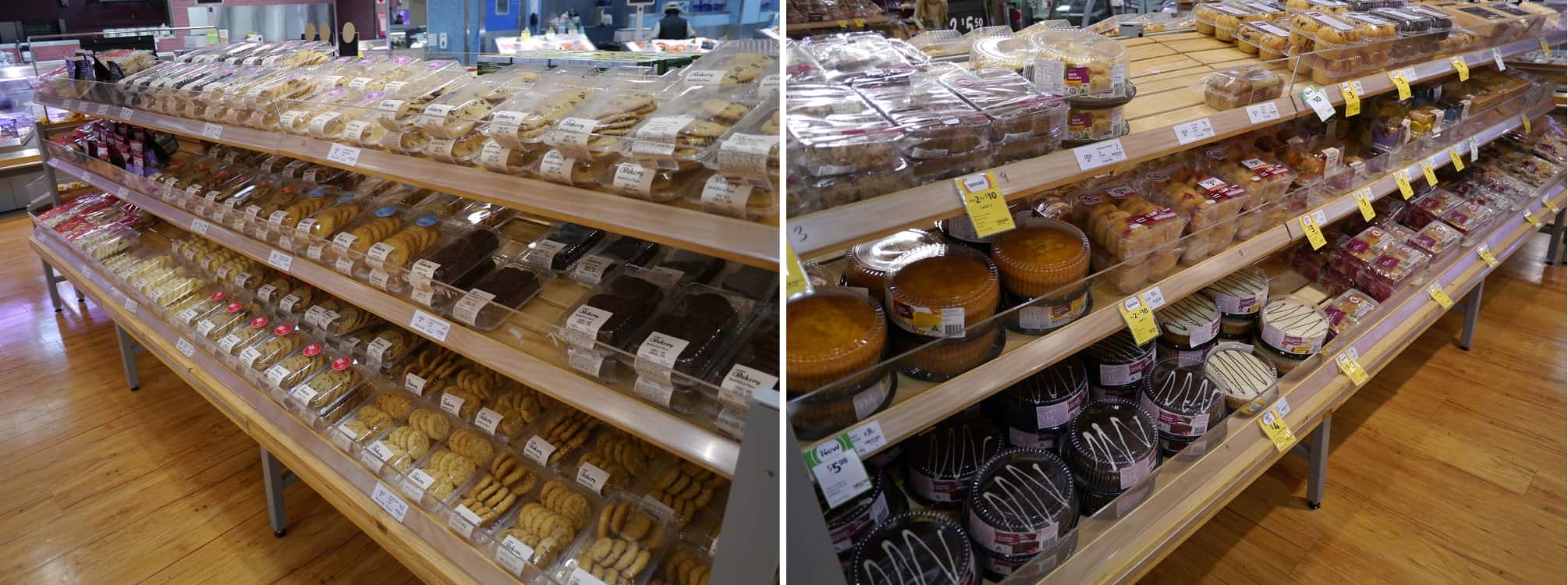


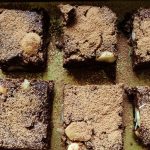

I totally agree with you there, our shopping at major supermarkets has dropped immensely! We now buy mostly basic foods and things from them. we spend probably as much in them as we do at the local markets or fruit and veg deliveries! :D
Yay, it’s great having that shift. I agree, they’re useful for emergencies or the odd thing but it’s so nice to do the majority of our shopping elsewhere!
I’ve heard that shopping at the big supermarkets should be limited to the perimeter (produce and bakery) because the aisles are all stuff just like you’ve pictured. I love the local farmer’s market too, but do still shop the produce aisles at the chain groceries. And the good news is that lately we are getting more choices. There are organic choices now even in the big stores, and varieties of fruit and vegetables. In the last few weeks, grapes are in season in the US and I’ve found 4 kinds I’ve never seen before. (and they’re delicious) So — maybe there’s hope!
I’ve heard that too, but it doesn’t work in my local because it’s not designed that way – there’s rubbish all round the edge too! The UK supermarkets are much better than Australian ones -there’s much more fair trade and organic in the UK. It’s great that stores are recognizing that people want organic an fair trade… hopefully Australia will catch on eventually!
Lindsay I live in the UK and although I agree with your statement about finding more organic and fair-trade products in our supermarkets, we unfortunately don’t have large or well stocked up farmers markets as you. Unfortunately!! As I am French originally now living in the uk and I’d say this is one thing I miss the full of seasonal and fresh produce. We have local market in my town where I live once a week, it to be honest 50% of it is full of non food produce (clothes, gadgets, etc) shame! I wish the uk caught up on the farmers markets…… Oh and very very few buy in bulk banks, one is opening soon in our town and I am soooo excited about it. I have my reusable cotton, mesh etc bags ready!
Well said :) I’m about to grab 2 shopping bags, walk to the local school to vote, and then to the farmers markets to do our weekly shopping. The more you shop at the farmers markets the less you want to set foot into a supermarket or spend cash on its offerings let alone eat them. It doesn’t take long to make a habit of it.
Couldn’t agree more! Farmers markets have so much energy, they always make me feel really alive – and then I notice even more how sterile the supermarkets are and want to go there less and less…
Oh gosh your words resonate deeply with me, especially the above, so vibrant and alive. But the whole article was resonant. It’s something I felt for years every time I walked in a supermarket, but just got on with it, feeling I had no choice.
Thank you so much for this article that makes it all clear as day. We do go to the growers markets here some Saturday’s, but I think I will be going every Saturday instead of the supermarket. Your article has cemented that for me.
Great article Own path guys, agreed totally. When are folk going to wake up to the fact that Mr C and Mr W sell us s@#$$!
Great post (although I think some of my friends in Australia might be secretly hoarding Tim-Tam’s & Cottage Cookies!). Here in America, I have been shopping at my local Farmers Market for a few years. I don’t ever buy food at my local supermarket anymore. Local & seasonal is the way to go. Not only is it healthier for our bodies, it’s healthier for the planet (lower that carbon footprint!). A good market will have everything you need; ours even has organic pet treats! It is a habit in need of redirection. Go local! Go seasonal! Learn how to put up food; it’s fun!
Totally! Couldn’t agree more!
that’s great! I can definitely relate to your decision.
But the potato chips LIndsay, the potato chips! – I can’t help it – and it is my only vice??
I hadn’t thought about that word before: Supermarket. It’s not a market. And it’s not super. Maybe it started out that way, but it’s not that any more. Are there any transition town or “incredible edible” type activities near you. Meet new people, most of whom will be lovely, and eat great food.
On a separate note, I’m sorry about your new Prime Minister.
How true. Yes there are Transition Town activities near me, and I am actually reading the handbook at the moment. Such a great movement : )
Thanks. I’m sorry too. The term for governments is three years here…seems like such a long time…
Part of my “No supermarkets for Lent” involves figuring out what of the remaining 10% of our shopping I can source elsewhere.
By the way, are bulk bin stores a bigger thing in Australia/Perth than they are in the UK? I have super grocery shops but my source of flour, pulses, dried fruit… (aka the local indie organic shop) still sends their produce pre-packed.
Hmm, I don’t know. I know there were bulk bin stores in Bristol, but I didn’t use them anywhere near as much as I should. Probably put the stuff in plastic bags too [rolls eyes at the naivety]. My sister lives near a health food shop in Newington Green in London, and that has bulk items – definitely dried fruit! I’m pretty sure she told me there’s another branch somewhere else – Islington?
I feel like they do exist more than we think, but finding them is the tricky part.
So I realize I am a few years late to this post, but I have just discovered your blog and am really enjoying it :)
My husband and I have been buying at bulk stores for about a year now and do our best to avoid packaging and plastic in general. One of the biggest solutions to produce issues from Zero Wasters seems to be to buy at farmers markets. Unfortunately, I live in Minnesota. There are literally only 4 months of the year where we do not have snow. Our farmers market season is very limited. How would you suggest we approach a lack of fresh produce available locally? When given a choice between organic produce that is shipped in from out of state and wrapped in plastic vs poorly but more locally grown produce, which would you go for? I would like to do more canning during the summer whilst produce is in season, but as vegetarians we rely heavily on veggies and tinned/frozen are not always ideal. Thanks in advance for any thoughts!
Hi Jalyss, you can be as late as you like, it’s lovely that you stopped by! : )
Hmm, they are interesting questions (and that is a lot of snow)! Let’s talk about local first. My idea of local has changed a lot since moving from the UK to Australia. In the UK local means UK-grown, even though Europe is a short (relatively) truck wide away. In Australia local often means Australian, even though it takes 5+ hours to fly from one end to the other! However, it’s very easy to truck produce around Europe, whereas in Australia we have strict quarantine laws and produce from inter-state is sprayed with methyl bromide – even if it is organic! I don’t know what local means for you, but there are lots of factors at play. If you can get fresh, tasty produce fairly locally then that is better than produce picked too early, sprayed and air freighted, I think. If the local stuff is rubbish, maybe look further afield at what is grown closer (relatively), what is trucked over freighted. Maybe you can buy some in bulk from veggie markets? Often potatoes can be purchased in sacks, or tomatoes or apples in boxes.
Canning is definitely a great idea, but I would think about what will can well and what you like to eat. I canned green beans once and they were so gross! Tomatoes are an obvious one. You can also dry / dehydrate lots of veggies – carrots, corn, mushrooms, onions which is another option – and they take up less space. Great for using in soups and stews. Fermenting veggies like cabbage, carrot is great too (and really good for you) and you don’t have to refrigerate although they get more sour over time.
I think you probably need a combined approach – thinking about what is available, what is easy to preserve and will taste good, and what you like to eat. If you can get lots of something locally but aren’t sure how to cook it, start researching recipes! Most veggies can be cooked in so many different ways – you will find a way that is tasty, I’m sure.
It sounds like a challenge, but a really fun one! Good luck! And I’d love to hear how you get on!
Very good.
A massive reason to abandon supermarkets completely are the moral/ethical reasons: To get cocoa, we have child labour and slavery, to get cheap items in Walmart and Asda we’ve got factory workers in Bangladesh and China working 14 hours a day for 17 cents an hour, to get coffee, sugar, and tea it’s more of the same. Illegal practices by food giants and other massive business so they can rake in billions. When people document the practices in cocoa plantations and ask big names like Cadbury, Mars, Nestle, and Hershey’s for interviews, every one of them decline and refuse to take responsibility. Their silence speaks far louder than their words.
I’ve stopped shopping at supermarkets and discount shops now. I only shop for local, seasonal food, as well as buying other things from charity shops or EBAY.